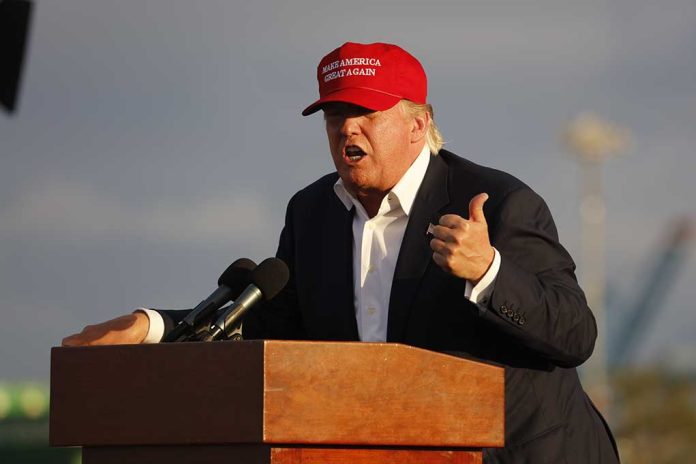
MAGA leaders stand united against U.S. involvement in the Israel-Iran conflict, putting “America First” principles ahead of another Middle Eastern war as key influencers like Tucker Carlson and Steve Bannon firmly warn President Trump against intervention.
Key Takeaways
- Prominent MAGA voices including Tucker Carlson, Charlie Kirk, and Steve Bannon strongly oppose U.S. military involvement in the escalating Israel-Iran conflict
- Republican lawmakers like Rep. Thomas Massie and Sen. Rand Paul advocate for diplomatic solutions rather than military intervention
- War hawks such as Sen. Lindsey Graham and media figure Mark Levin support Israeli strikes, creating tension within conservative circles
- The U.S. military has already increased its presence in the region and assisted Israel by intercepting Iranian missiles
- President Trump faces a critical foreign policy decision that could define his presidency while balancing his “America First” promises against support for Israel
MAGA Influencers Reject War with Iran
As tensions between Israel and Iran reach dangerous levels following recent strikes and counterstrikes, influential voices in the MAGA movement have taken a firm stance against American military involvement. War-weary Americans, particularly those who supported President Trump’s promises to end “endless wars,” are increasingly concerned about the prospect of the United States being drawn into another Middle Eastern conflict. The stark division among conservatives reflects broader national debates about America’s proper role in international conflicts.
Media personality Tucker Carlson has emerged as one of the most vocal critics of potential U.S. involvement, arguing that America’s continued funding and arming of Israel already implicates the nation in the strikes against Iran. Steve Bannon, former White House strategist, similarly emphasized that while Israel has every right to defend itself, American interests must come first.
“I can tell you right now, our MAGA base does not want war,” said Charlie Kirk, founder of Turning Point USA.
Political Divide Among Republicans
The conflict has exposed significant divisions within Republican ranks. Traditional neoconservative voices, represented by figures like Senator Lindsey Graham, have enthusiastically supported Israel’s strikes against Iran. This hawkish position stands in stark contrast to the more cautious approach advocated by libertarian-leaning Republicans like Senator Rand Paul and Representative Thomas Massie, who have consistently opposed U.S. military interventions abroad and emphasized diplomatic solutions.
“We don’t oppose Israel being Israel first. We get it. They should be Israel first. But we have to be America first. The bottom line is we cannot be dragged into a war on the Eurasian landmass in the Middle East,” said Steve Bannon, former White House Chief Strategist.
Representatives Marjorie Taylor Greene and Thomas Massie have both expressed opposition to funding the conflict, emphasizing that President Trump was elected partly on his promise to avoid foreign entanglements. These lawmakers argue that the United States should use its diplomatic influence to promote peace rather than increasing military presence in the region.
Trump’s Critical Foreign Policy Decision
President Trump now faces what Tucker Carlson described as a defining moment for his presidency. Having campaigned on an “America First” platform that prioritizes domestic concerns over foreign interventions, Trump must balance his support for Israel with his promises to avoid new conflicts abroad. This tension is evident in Trump’s own statements, which have alternated between extending diplomatic overtures to Iran and adopting tougher rhetoric about Tehran’s nuclear ambitions.
“What happens next will define Donald Trump’s presidency,” warned Tucker Carlson, emphasizing the gravity of the decision facing the president.
The situation has already progressed beyond rhetoric, with the U.S. military assisting Israel by intercepting Iranian missiles and increasing its presence in the region. Several Navy ships have been repositioned to support potential operations, raising concerns among non-interventionists that America is sliding toward direct involvement despite public wariness.
Growing Consensus for Peace
Despite differences in motivation, a growing consensus against U.S. military intervention in the Israel-Iran conflict has emerged across political lines. While MAGA influencers oppose intervention based on “America First” principles and war fatigue, some progressive legislators oppose it based on criticisms of Israeli policies. This unusual alignment reflects broader American exhaustion with Middle Eastern conflicts after decades of military engagement in the region.
“The real divide isn’t between people who support Israel and people who support Iran or the Palestinians. The real divide is between those who casually encourage violence, and those who seek to prevent it — between warmongers and peacemakers.” stated Tucker Carlson, emphasizing the fundamental choice facing American leadership.
As the conflict continues to unfold, with Iran launching missiles at Israel and Israel conducting targeted strikes against Iranian military facilities, the pressure on President Trump to chart a clear course will only intensify. His response will likely define not only his presidency but also the future direction of American foreign policy in the Middle East and the Republican Party’s stance on international engagement.




